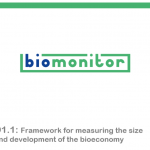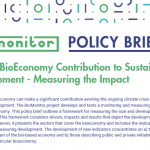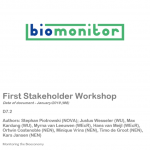Framework for measuring the size and development of the bioeconomy
This deliverable develops a conceptual analysis framework for quantifying and analysing the development of the EU bioeconomy in the BioMonitor project. This includes defining the scope of the bioeconomy to be considered within the BioMonitor project in terms of sectors and products involved, geographical coverage, time period, as well as the focus topics. The EC’s 2018 Bioeconomy Strategy Update recently confirmed that the bioeconomy is high on the political agenda and includes three main action areas, namely 1. Strengthening and scaling-up the bio-based sectors, unlocking investments and markets; 2. Deploying local bioeconomies rapidly across Europe; 3. Understanding the ecological boundaries of the bioeconomy. These action areas constitute an important guidance for how the scope or contents of the monitoring and measuring framework of BioMonitor must look like.
The ‘bioeconomy’ has several related terms, such as ‘bio-based economy’, ‘green economy’ and ‘circular economy’. There are clear synergies between especially the bioeconomy and circular economy concepts, such as cascading use of biomass. Factors have been determined to understand what the development of the bioeconomy drives. Knowing these driving forces provides important information for monitoring activities. The sectors covering the bioeconomy have been identified as well as a set of indicators that are going to be quantified and monitored. In our framework measuring developments will in particular focus on the bio-based sectors, because the traditional part of the bioeconomy can already be monitored. The selected indicators commit to the EU Bioeconomy Strategy objectives and are conform with findings from previous studies and stakeholder consultations. Additionally, a several new indicators have been suggested. They are related to measuring the impact of changes in supply, demand drivers, resource availability and policies on sustainability goals.





